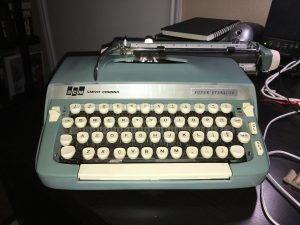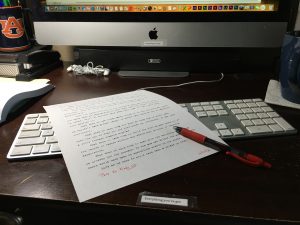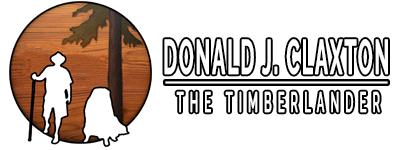My New Writing Tool: A Super Sterling Typewriter
Ah, the comforting sounds of a Super Sterling typewriter
I bought a 1960s model Smith-Carona Super Sterling typewriter in October of 2017. Why would an action/adventure writer with three Macs, an iPhone, and an iPad Pro need a typewriter?

The 1960s Smith-Corona Super Sterling typewriter. My “new” writing tool of old.
The answer is simple. Typewriters themselves are time machines with special powers. Using one to write drafts changed the metering and rhythm of my writing. And using a typewriter has slowed me down while drafting a story.
The one I bought is the same model my dad bought while in school at Perdue. The same typewriter I used after promoting myself from my red toy typewriter to Dad’s. This typewriter is the same color, same everything.
Julia Cameron
In Julia Cameron’s The Artist’s Way trilogy, she says writers are buying old typewriters. They are making a comeback. But she stands by her rule that one must continue to write Morning Pages by hand. These are three pages of an open-minded stream of consciousness. Why does she discourage typing Morning Pages?
Because when using a keyboard, our human brains do not delve deep enough.
I know there are writers who go even further and write their books by hand. But limits exist about how far back I need to go with this venture. In med school, the professor would have awarded me with an A in Graduate Level Bad Handwriting on the first day of classes. But I say, four years and almost 30 composition notebooks filled with Morning Pages have done wonders for me.
The intimacy of writing drafts on a typewriter
Now you might think having a typewriter vs a computer is akin to John Henry vs. the steam engine. But guess what I realized after four days of having a typewriter next to my MacBook Pro?
Writing my novel, blog posts, and social media stories all became more intimate.
From age 10 onward, I used Dad’s typewriter to compose stories. One of my top lifelong dreams became to live the life of a writer. Using my dad’s mint green machine put me well on the way toward success. Or, so it felt.
There is excitement in feeding a blank piece of paper around the drum of the machine. There is a click and echo the machine makes when you push back the rollers to straighten the paper. The feeling is exhilarating. With the paper aligned and snapped into place, there is no sound quite like scrolling the drum knob to get far enough down the page to type.

Using a typewriter is changing the clarity of what I write.
When typing, I do not stop and bother with typographical errors. No one ever will see this page except me. I am in rough draft mode.
The mission: Get the story on paper
The mission is to get the story on paper. Not to write and edit. I’m not out to waste half a bottle of whiteout. What develops on the page is intimate. Already. My writing is better. I think more clearly because part of my brain still wants to type the perfect sentence. No grammar mistakes. No typos. Perfection.
To prove Ernest Hemingway wrong. The first draft of anything is not always “shit.”
Time travel is possible; writers do it almost every day
With the clicking and clacking, I exist as one with the psyche of my characters. My story takes place when I was a tween. Though I have not visited my own way of thinking in those days in decades, the feel of the keys, like an old song, opens doorways. Monsters, or as one of my characters from Louisiana calls them, “Haints” run wild.
We are all in the same plush woods of the Upper Peninsula of Michigan. The same typewriter puts me in a chair by the window overlooking the parking lot between our housing units. Some of the play I had as a kid seeps into the scene from I do not know where. Much like Dickens experienced with Ebenezer Scrooge returning to his boarding school. I understand how much innocence is since lost. I stand resolute in a far simpler time. An era I had no comprehension of how much Time would mangle.
But now that the weight of modern life has weathered me almost beyond recognition, I know which keys tighten the screws of my characters. As a writer, I delight in this. I am my antagonist. Life is making more sense now. This is an experience I need. One that will help me let go of the past. What I need in order to move forward in my life at long last.
Conclusion
My Super Sterling typewriter itself is a time machine. Fewer and fewer exist these days thanks to computers. At least companies can make turntables for vinyl records once more. Making all the parts for mass production would lead to a typewriter no one could afford in this day and age. Even if they did, I would not buy one. There is a spirit that lives in these old machines. An energy field writers may tap into. And the reward for doing so is bliss!
